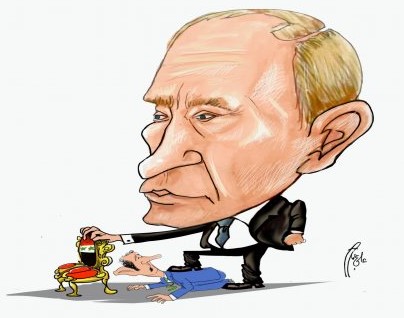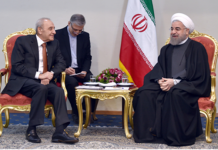Analysis/Russia’s Claims on Downed Plane Over Syria Are Dubious, but Will Usher in New Reality for Israel
عاموس هاريل من الهآررتس: ادعاءات روسيا حول اسقاط طائرتها في سوريا مريبة ومشكوك بها ولكنها نذير لواقع اسرائيلي جديد
Amos Harel/Haaretz/September 24/18
With Israel insisting on its right to attack Iranian arms shipments to Hezbollah, Jerusalem is bound to face a dilemma soon .
The Russian Defense Ministry’s scathing report, which placed the full responsibility for the downing of the Ilyushin plane over Syria last week on Israel, should not surprise anyone in Israel – except maybe for a few foolish supporters of Prime Minister Benjamin Netanyahu. No matter how good his relations with Russian President Vladimir Putin may be, Netanyahu cannot make the problem disappear. Russia suffered an embarrassing blow when Assad’s anti-aircraft fire shot down the plane, and it still has widespread interests to promote in Syria. It was rather clear that the affair would lead to a Russian condemnation of Israel and to certain demands, even though the bottom line still depends on Putin’s decision.
Moscow cannot accuse the main culprit responsible for the incident – its ally, the Assad regime (although it is amazing to see that blame for the Syrian anti-aircraft forces does not even appear in the Defense Ministry’s official statement). It was therefore clear from the beginning that the responsibility would be placed on Israel. It is also interesting that all the blame is directed at the Israel Defense Forces, which the Russians accuse of being unprofessional or “criminally negligent, at the very least.” The Israeli political leadership is not mentioned, except for one general claim regarding Israel’s dangerous offensive police in Syria.
The Russian inquiry’s credibility is rather dubious. Some of the claims included in its announcement are strange. For instance, the Russians claim Israel gave them a warning of only one minute, and it is surprising that Israel has not stated the real number, a much longer period of time. According to experienced Israeli pilots, the claim that the Israeli warplanes hid behind the Russian intelligence gathering plane is unreasonable and does not fit in with accepted operational conduct.
The accusation that Israel supposedly deceived the Russians about the location of the planned attack also seems illogical. According to Russia, the Israeli air force informed it about an attack in northern Syria, while the attack occurred in western Syria. In reality, Latakia is located in north-west Syria, as even a quick glance at a map of the country will reveal. And because the military coordination has been working successfully for three years now, during which hundreds of Israeli attacks have taken place, it is hard to believe that the two sides have yet to make clear between them some basic terminology.
The Russian announcement focuses mostly on the tactical level and does not include imposing any sanctions against Israel. Russia accuses Israel of ungratefulness in light of the steps it has taken on behalf of Israeli interests, such as distancing Iranian forces from the Israeli border on the Golan Heights (the Russians say they succeeded in distancing them to a far point, 140 kilometers away, while in reality it is 85 to 100 kilometers, a buffer zone that does not include Damascus, where Iranian soldiers still remain).
On the strategic level, it is likely that Putin – who has the final word on the Russian side – will leverage these serious claims in the Defense Ministry report to demand increased diplomatic coordination with Israel in Syria, and to impose stricter rules for the joint military coordination mechanism between the two countries.
Brig. Gen. Assaf Orion of the Institute for National Security Studies estimates that the price Putin will demand from Israel may come from another direction: Insisting on selling advanced anti-aircraft systems to Syria, despite Israel’s opposition. Alternatively, he could also pressure Netanyahu to help ease tensions between Russia and the United States. In the meantime, the IDF Spokesperson issued a statement Sunday rejecting the main points of the Russian investigation but promising to maintain security coordination between Israel and Russia.
The practical test for the relations between the two countries is sure to come soon, when a new intelligence warning pops up about an Iranian attempt to smuggle arms into Lebanon on a route near the Russian bases in northwestern Syria, or to establish a new military site. Because Iran is determined to continue with its arms shipments to Hezbollah, and Israel has stated publicly that it stands on its right to attack such shipments, Jerusalem is bound to face a dilemma: Should it attack once again near the Russians and risk increased tensions with them?
This is not the end of an era for Israel’s military operations in Syria, where it has conducted hundreds of attacks in the north over the past six years. But for now, it looks as if the situation on the northern front will also not return fully to the conditions that existed there before the Russian plane was shot down.
Israel has operated freely in northern Syria for years thanks to the combination of offensive actions and good diplomatic relations with the Russians. Mostly, Israel acted with strategic acumen, achieving a large part of the goals it set for itself.
But Israel is not a superpower and is not invincible. It will have to take into account Russian considerations and maybe even adapt its offensive operational model. From conversations I conducted with senior defense officials, it seems they ascribe great importance to the implications of the latest incident. Those who continue to claim that this is just a mild bump to the wing must be so busy defending Netanyahu’s image that they are simply no longer capable of analyzing reality objectively.
*Amos Harel/Haaretz Correspondent























